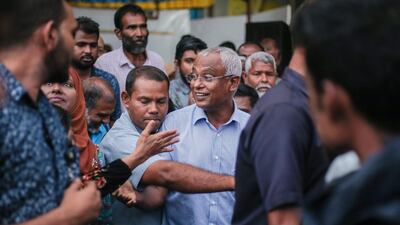When most people think of the Maldives, they may not immediately alight on the image of a country that has just had a second chance at democracy. No, they think instead of the pristine beaches, crystalline waters and expensive resorts that have made the Indian Ocean state one of the world’s most upmarket tourist destinations. But that is only the Maldives of the holidaying visitor.
After strongman president Abdulla Yameen unexpectedly lost to the opposition's Ibrahim Mohamed Solih last week, the country is now the latest to push back against China's Belt and Road Initiative, to reject the corruption associated with a long-serving politician, and to kick out an authoritarian government that threatened to undermine its youthful and fragile democracy.
For a long time hardly anyone took any notice of the Maldives' internal politics at all. Mr Yameen's elder half-brother, Maumoon Abdul Gayoom, was the country's effective dictator from 1978-2008. While the economy advanced considerably, dissenters were imprisoned and torture was widespread. It was only after a young inmate, Evan Naseem, was beaten to death by security personnel in 2003, leading to riots in the capital, Male, and a state of emergency was declared by the government, that the world started to look a little more closely.
Mr Gayoom knew the bad publicity could be devastating for tourism – a vital source of government revenue – so he engaged a global PR firm, Hill+Knowlton, to come up with a roadmap for reform. It produced a series of recommendations, which culminated in the country’s first democratic elections in 2008. If Mr Gayoom had merely intended to polish his country’s image but remain firmly in charge himself, he miscalculated. He lost. The victor was Mohamed Nasheed, a 41-year-old British-educated former journalist who had been jailed frequently for criticising the dictatorship.
Despite having undergone horrific experiences in prison, including being forced to eat ground glass and being trapped in a metal box and left for days in the searing sun, Mr Nasheed took an admirably forgiving approach to his predecessor’s administration. When I interviewed him in 2009, he told me that he rejected “sweet revenge” even though he knew personally of all the human rights abuses. “I’m trying not to prosecute the former regime,” he said. “I’ve only removed the chief of police. The rest of the top brass are my own interrogators.”
Mr Nasheed's efforts to warn of the dangers of climate change were eye-catching – he once held a cabinet meeting underwater, with ministers in scuba gear – but his caution in taking firm steps to consolidate democracy and to replace what he rightly called a "very hollow" judiciary cost him dearly. In September 2011, I warned in these pages that the transition to democracy was in trouble. Five months later, Mr Nasheed was forced to resign the presidency at gunpoint in a coup the world was slow to acknowledge. Eventually sentenced to 13 years on a concocted charge of terrorism, he subsequently went into exile in the UK and then Sri Lanka.
His successor in the 2013 presidential elections was not Mr Gayoom, as I had predicted. Instead he backed his much younger half-brother, Mr Yameen, who narrowly beat Mr Nasheed in the second round of voting. Such was the democratic regression that followed, including interference with the judiciary, targeting of opposition politicians and undermining of institutions, that the Commonwealth gave Mr Yameen six months to clean up his act in 2016. He decided to quit the association instead.
Opposition at home mounted over increasing allegations of blatant corruption and money-laundering, selling off islands to developers without open tender, and putting the country in a “debt trap” to China for pricey projects such as a $200 million bridge between the islands housing the capital and the airport.
It is possible that Mr Yameen might have got away with it, however − had he not fallen out with his brother. Some say the younger man’s excesses proved too much for Mr Gayoom. It is also suggested that Mr Yameen had felt slighted as a child because his mother was considered to be lower class than Mr Gayoom’s, and that he harboured further resentment over his treatment when serving as a minister under his brother.
Either way, in February Mr Yameen had Mr Gayoom and his son Faris arrested on charges of trying to overthrow the government. This may have been a mistake: reportedly, some of the arresting officers appeared reluctant, and saluted their former commander-in-chief. The same month Mr Yameen declared a state of emergency after refusing to accept a Supreme Court decision to release nine jailed opposition politicians.
As the repression tightened, it was widely assumed that Mr Yameen couldn’t lose last month’s vote; with the country’s electoral commission in his pocket, he could rig it if necessary. In the event, his opponent’s margin of victory was too overwhelming and he conceded within hours of the result. Mr Solih, a long-serving MP with a calm, modest manner, who became the Maldivian Democratic Party’s candidate after Mr Nasheed was ruled ineligible by the election commission, will become president next month.
It is ironic that the country’s return to democracy should have been facilitated by an alliance with Mr Gayoom, and one of Mr Solih’s tasks will be to overhaul and ensure the independence of the institutions that should have taken place before. Although he will inevitably review the relationship with China, the latter’s capacity to provide economic heft means that the change will probably be less dramatic than some have suggested. At the same time, there is no doubt that the Maldives’ traditionally strong alliance with India will resume.
But above all, it is a new beginning for the country. Few countries get a second chance at forging a new democracy so soon after their first attempt failed. The spirit of reconciliation must be tempered by the determination to see real change on this occasion. No Maldivian, surely, wants to rely on the idea of “third time lucky”.


